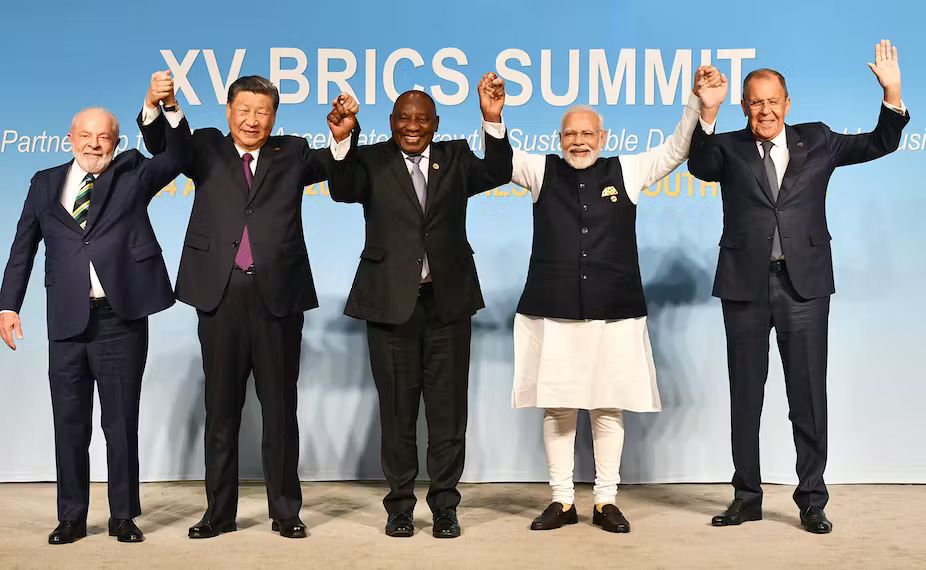
Last August, the BRICS Leaders’ Summit was held in Johannesburg – a formidable alliance rumored to plan a significant expansion in January 2024. The BRICS, which consists of five developing nations (Brazil, Russia, India, China, and South Africa), will reportedly broaden their alliance and accept six new countries in their group.
According to Reuters, Chinese President Xi Jinping conveyed their alliance expansion as a ‘historic’ moment. South African President Cyril Ramaphosa also reportedly views this expansion as a way to build a fairer and more inclusive world.
“BRICS has embarked on a new chapter in its effort to build a world that is fair, a world that is just, a world that is also inclusive and prosperous,” Ramaphosa told Reuters.
A group of powerhouse alliances that represents a staggering 23% of the world’s Gross Domestic Product (GDP) and boasts 42% of the global population undeniably holds a pivotal role in the world economy. Since it consists of five developing countries that knowingly aren’t US allies, this expansion triggers a wave of compelling questions about the future of the global economic order. One intriguing prospect that surfaced from this recent development is the potential birth of a brand-new currency that may dethrone the reigning champion, the U.S. dollar.
Saudi Arabia, UAE, Iran, Egypt, Ethiopia, and Argentina are six new countries that will reportedly join BRICS. Each country has its own relationship with the US and uses the dollar in its global trade. One example is the relations between the US with two of the rumored new members, Saudi Arabia and the UAE.
Globally, these two countries are considered important oil and gas partners of the United States. For years, the U.S. dollar has reigned supreme in the global oil market and become the currency of choice for oil trade. The system itself granted the United States long-staying power by enabling the nation to print more dollars to buy oil, consequently leading to inflationary pressures.
As a major oil producer, it’s obvious that the United States has historically leveraged Saudi Arabia and the UAE by demanding the world to use the U.S. dollar in the global oil trade. Because of this reason, their possible entry into BRICS could change the global oil market influence, potentially decreasing reliance on the dollar for oil transactions and posing a formidable challenge to the dollar’s ongoing dominance.
Expansion aside, BRICS reportedly pre-planned the creation of a common currency for bilateral trade and investment use among BRICS allies. This idea was proposed by Brazil’s President, Luiz Inácio Lula da Silva, during the BRICS Leaders’ Summit held last August. As reported by Reuters, Lula da Silva thinks nations shouldn’t be forced to trade in the U.S. dollar and believes that BRICS’s new currency will “increase our payment options and reduce our vulnerabilities.”
![Brazilian President Luiz Inacio Lula da Silva has questioned the world’s dependence on the dollar [Ueslei Marcelino/Reuters]](http://ayopost.org/wp-content/uploads/2023/09/2023-08-22T134027Z_155618200_RC2QB0AP57NR_RTRMADP_3_BRICS-SUMMIT-BRAZIL-1692847345.webp)
Since BRICS allies have a ‘new currency’ plan, it is likely that this will affect the U.S. dollar dominance not only in the oil sector but also in other areas. Beyond the oil market, BRICS members are pivotal players in the fields of technology, manufacturing, and services. A growing trend is also happening among BRICS allies, especially in the trade sector, because BRICS nations have actively invested in each other’s currencies. This aftermath is sure to challenge the U.S. dollar’s supremacy even more and could significantly lessen reliance on the dollar in the commodities market among BRICS nations. Effectively, the US will also be unable to manipulate the value of its currency.
Furthermore, the BRICS nations knowingly established financial institutions such as the New Development Bank and the BRICS Contingent Reserve Arrangement. These firms can potentially reduce reliance on the U.S. financial system, thus challenging the dollar’s dominance by securing funding for infrastructure and sustainable development projects within the BRICS alliance.
In summary, the forthcoming expansion of the BRICS alliance raises important questions about the future of the global economic order. This expansion is seen as a pivotal moment with the potential to challenge the dominance of the U.S. dollar across various sectors. Furthermore, BRICS’ plan to establish a new currency and financial institutions may decrease dependence on the US dollar within BRICS nations. This transformation could signify a significant shift in global trade and financial dynamics.

About the Author
Hello there! I’m Sari Dewi, an enthusiastic and passionate writer from Indonesia. As a volunteer at AYOPOST, I’m dedicated to providing valuable information on Youth Insight topics. Immersed in the captivating realms of foreign policy, politics, and economic development, my passion ignites a relentless pursuit of knowledge. AYOPOST fuels this fire, providing a platform where I empower ASEAN youth, foster meaningful connections, and catalyze transformative change. Let’s embark on this exciting journey together, shaping the future with unwavering determination and enthusiasm.